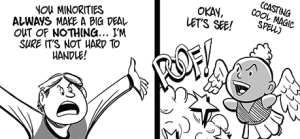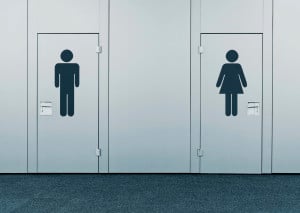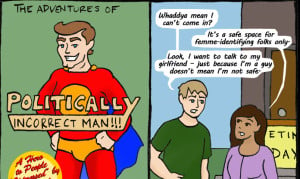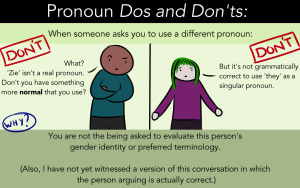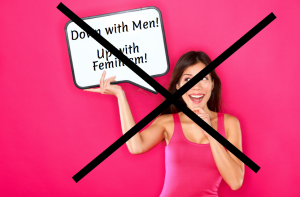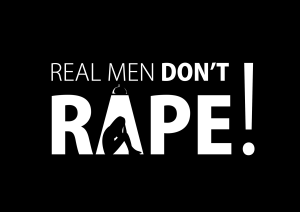
Source: Thread Paints
Read this article in Spanish here.
(Content Warning: sexual violence)
For my entire life, I’ve heard that real men don’t rape.
But the man who raped me was not imaginary – he was indeed very real.
Yet, a great number of people use the phrase “real men don’t rape.” While it usually comes from a place of good intention, the phrase ultimately harms survivors and reinforces rape culture.
We usually say that real men don’t rape because we’re trying to create a culture that shames rapists. We try to make them feel inferior to “real men.” Essentially, we want them to feel that rape is not part of a “real” masculinity.
The problem with saying that real men don’t rape is that society already has an idea about who “real men” are.
We’re trying to say “Hey, you don’t need to rape to express or prove your masculinity.” But instead, the phrase unintentionally insinuates that men who conform to the dominant masculinity are incapable of rape.
1. The Monster Myth
There are many rape myths out there, but one that’s particularly dangerous is the idea that rapists are unknown, strange monsters.
We want to feel comfortable around the people we know, and for that reason, we’re likely to believe that knowing someone means that they’re less likely to assault you.
Various sources show that this isn’t the case.
Most victims of sexual assault are likely to know their perpetrator. In the US, it is estimated that about 73% of victims are familiar with their perpetrators.
For this reason, the strong emphasis on “stranger danger” can be incredibly harmful.
Of course, strangers can be dangerous, but we need to acknowledge that rape is committed by the people we know, too – including our colleagues, family members, friends, classmates, romantic/sexual partners, teachers, police officers, and well-respected celebrities and community leaders.
If we overemphasize the idea that rape is committed by strangers, we effectively perpetuate the myth that we can’t be raped by people we know.
We call this myth “The Monster Myth.” While the idea behind this myth has been discussed by feminists and activists for many years, this specific term was further popularized by Tom Meagher who discussed it in a blog post called “The Danger of the Monster Myth.”
Tom’s wife, Jill Meagher, had been violently raped and murdered by Adrian Bayley. In the blog post, he discusses how society perpetuates the idea that rapists are monsters and not normal, average people:
The monster myth perpetuates a comforting lack of self-awareness. When I heard Bayley forming sentences in court, I froze because I’d been socialized to believe that men who rape are jabbering madmen, who wear tracksuit bottoms with dress shoes and knee-high socks. The only thing more disturbing than that paradigm is the fact that most rapists are normal guys, guys we might work beside or socialize with, our neighbors, or even members of our family.”
The idea behind the Monster Myth is simple: Society believes that rapists are abnormal, strange, weird men, and that men who are “normal” don’t rape. Phrases like “real men don’t rape” inadvertently perpetuate this myth.
This myth is dangerous for two key reasons. Firstly, it means we’re less likely to believe survivors who have been raped by people who fulfill their masculine roles. Secondly, it leads to the further demonization of men who don’t conform to society’s masculine ideals.
2. Disbelieving Survivors
I’ve heard so many people doubt the validity of rape accusations based on the perceived character of the rapist. I’m sure you have, too.
Consider how the defenses of Woody Allen were embellished with details of his relationship with his children or how Phylicia Rashad defended Bill Cosby, saying that she thinks the accusations against him are being orchestrated by someone who wants to destroy the “legacy” of Cosby and The Cosby Show.
Even in cases such as Steubenville – where there was video evidence of the rape – the mainstream media seemed to take the side of the perpetrators. Many news outlets spoke extensively about the perpetrators’ “promising football careers,” lamenting the fact that the rape would hinder their futures.
At the same time, the media seemed to blame the victim, who was drunk at the time of the assault.
These defenses have recognizable patterns: They rely heavily on emphasizing how “normal” the alleged perpetrator is. And of course, a part of their normality is their adherence to certain gender-based expectations.
Bill Cosby played the fatherly character of Cliff Huxtable, the head of what Phylicia Rashad described as “the American family.” Woody Allen is a kind father. Ma’lik Richmond and Trent Mays were football stars.
These men are “real men” – they act pretty much as society tells them to act. So how could they possibly be rapists?
The truth is that anybody can rape and be raped, regardless of their character, their gender, or their age. I’ve met rapists who seem smart and genuinely kind. I’ve met people who were thoughtful and interesting, and later found out that they had sexually assaulted people. My rapist was a popular, intelligent, seemingly sweet guy who was great at academics and a star soccer player.
Repeat after me: People who seem nice can be rapists.
People who seem “normal” can be rapists.
Real men do rape.
And yeah, even feminists can be abusive.
Disbelieving survivors does not just mean that there are fewer consequences for the rapists. When we victim-blame or insinuate that most survivors are lying, we discourage survivors from seeking support and further isolate them.
3. Demonization of Marginalized Men
The phrase “real men don’t rape” insinuates that proper, normal men don’t rape.
Let’s think carefully about which men society deems “normal”: cisgender, able-bodied, neurotypical, heterosexual, white, middle-class men. On the other hand, transgender, mentally ill, physically disabled, non-heterosexual, poor men of color are deemed abnormal.
Think about it: On crime shows, how often is a serial rapist represented as mentally ill? How often are trans people portrayed as the victims of crimes as opposed to the perpetrators of crimes? How often do the media portray rape in middle-class settings, as opposed to in impoverished settings? How often are perpetrators of sexual violence portrayed as “weird?” How often are rapists portrayed as black men?
In summary, the most privileged men in society are believed to be incapable of rape. And that’s no coincidence – this is because privileged people have extensive influence over how the media represents them.
An example of this is the black brute stereotype, which has been perpetuated by white-controlled media for many years. This is the idea that black men are sexually violent, which is linked to the colonial-era perception of black people being sexually “unrestrained.”
This is just one of the many examples of how the mainstream media perpetuates harmful rape myths which further the oppression of marginalized people.
Why Do We Hold Onto the Idea That Real Men Don’t Rape?
I can’t help but wonder why society insists that real men don’t rape. Why exactly is this idea so appealing?
The fact of the matter is that normal people do rape. Plenty of rapists are not, in fact, outliers of society – they have been socialized in a society that subtly accepts rape.
But admitting that normal people rape would be admitting that our society is one that produces rapists.
This admission would require us to acknowledge that we’re complicit in rape culture. It would require us to be introspective, challenge some of our beliefs, and change for the better.
It would require us to take personal responsibility for perpetuating rape culture. It would require us to think carefully about how we teach children consent, how our language perpetuates rape culture, and how institutions that uphold rape culture, such as the prison system.
This is extremely hard work. It’s easier to dismiss rapists as abnormal than to take on the monumental task of challenging rape culture.
But if you – like me – are eager to tackle rape culture and create a society that is safer and more supportive for survivors, we need to be prepared to take on this difficult task.
***
If we really want to reduce the incidence of rape while supporting survivors, we need to think critically about anti-rape campaigns. We need to ask ourselves whether our actions and words do more harm than good.
Saying that real men don’t rape is ultimately harmful and oppressive. In order to effectively tackle rape culture and support survivors, we need to admit that real people of all genders can and do rape.
[do_widget id=”text-101″]
Sian Ferguson is a Contributing Writer at Everyday Feminism. She is a South African feminist currently studying towards a Bachelors of Social Science degree majoring in English Language and Literature and Gender Studies at the University of Cape Town. She has been featured as a guest writer on websites such as Women24 and Foxy Box, while also writing for her personal blog. In her spare time, she tweets excessively @sianfergs, reads about current affairs, and spends time with her gorgeous group of friends.
Search our 3000+ articles!
Read our articles about:
Our online racial justice training
Used by hundreds of universities, non-profits, and businesses.
Click to learn more
Most Read Articles
- « Previous
- 1
- …
- 30
- 31
- 32









